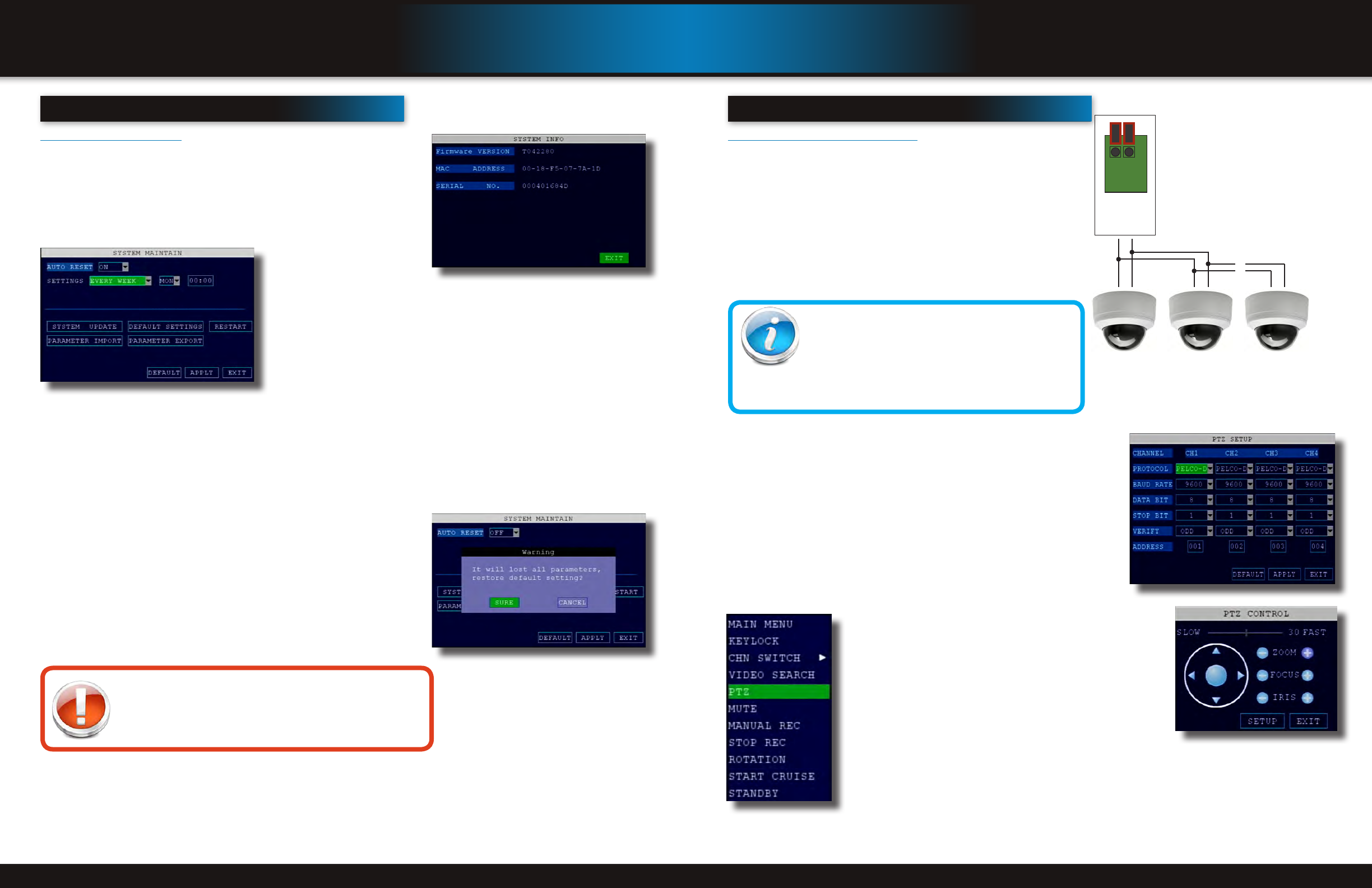
Page 24 Page 25
advanced operatIon
system
advanced operatIon
PTZ
pan/tIlt/zoom...ptz
Pan/Tilt/Zoom (PTZ) Setup:
NOTE: Consult the instruction manual of your PTZ camera for complete
information about your camera, including protocol, baud rate, data bit,
stop bit and parity settings before beginning setup. Enter these settings in
the DVR.
Step 1: Connect your PTZ Camera to this DVR
Connect a PTZ camera to the BNC and DC power cables. Also, connect
the communication cable from the PTZ camera to the 485A (TX, +)
and 485B (RX, -) control inputs to the Alarm/PTZ block on the back
of the DVR. Note there is only one set of PTZ control inputs (485A &
485B), however multiple PTZ cameras can be set up by making parallel
connections. See diagram for details and see “PTZ Camera Setup” Info
box for additional information.
Step 2: Configure PTZ Communication Settings:
To access this menu, from the MAIN MENU click ADVANCED then PTZ (see
PTZ Setup image). The PTZ setting options for each camera can be selected
independently and are available under each camera’s channel number.
1. Under PROTOCOL, select PELCO-D or PELCO-P for the selected channel.
2. Under BAUD RATE, select 1200, 2400, 4800, or 9600.
3. Under DATA BIT select 5, 6, 7, or 8.
4. Under STOP BIT, select 1 or 2.
5. Under VERIFY, select ODD, EVEN, MARK, SPACE, or NONE parity bits. Note:
Mark = 1, Space = 0 parity bits.
6. Under ADDRESS, provide an address from 001~255 using the Virtual Key-
board for each PTZ camera.
7. Click APPLY. Click OK in the confirmation window.
8. Click EXIT in all menus until all windows are closed.
Step 3: Configure the Operation & Control of your PTZ
Camera(s):
After your PTZ camera(s) are set up you can control their
operation from your DVR. Note: Individual features must be
available on your camera to operate.
1. In Live View, double click on the Channel with the connected
PTZ Camera to open to full screen view. This selects the
channel to configure and control.
2. From the Quick Access Menu select PTZ. (See image at left)
3. From the PTZ Setup screen you can adjust:
• Pan Speed: Adjusts the speed the camera will move.
• Zoom: “+” Zooms in and “-” zooms out
• Focus: “+” and “-” focuses the picture.
• Iris: “+” lets more light in and “-” removes light from the picture. This is useful to correct
backlight issues.
• Directional keys: Left and Right Arrows control the pan; Up and Down arrows control the tilt. Tip:
Hold the mouse button down while clicking on an Arrow Key and drag the cursor away from the
key to initiate the Auto Movement feature. The camera will pan continuously 360 degrees from
the position it is in or tilt up or down to the limit of the camera until you click OK. This is useful if
you want to manually operate the camera without continuously holding or clicking the arrows.
PTZ Camera Setup
NOTE: It is recommended for best results to use 120Ω
shielded twisted pair cable of a sufficient gauge to meet
your application length. 18 to 22 gauge is usually sufficient.
In addition, be sure to only install the 120Ω terminating
resistor that comes with your PTZ camera in the last parallel connected
camera. Keeping that resistor in all cameras can possibly degrade the
signal and can cause unexpected or loss of operation and control.
Install 120 Ω
terminating
resistor in last
camera only
485A
485B
PTZ Inputs Conguration
BA BA BA
~
~
PTZ Setup
Select PTZ from the
Quick Access Menu
PTZ Setup - Sub Menu
system Info and system update
System Information:
View system information, including the firmware version, MAC address, and
serial number of the system. To access this menu, from the MAIN MENU click
ADVANCED then click INFO.
System Maintain
Use the SYSTEM MAINTAIN menu to update system firmware and set an
automatic system reset schedule. To access this menu, from the MAIN MENU click
ADVANCED then click MAINTAIN.
To enable AUTO RESET:
1. Under AUTO RESET, select ON. The Settings option appears.
2. Under SETTINGS, select
EVERY DAY, then set the time of day using the Virtual Keyboard
EVERY WEEK, then set the day from the drop down menu and time of day
EVERY MONTH, then set the month from the drop down menu and the time
of day.
3. Click APPLY. Click SURE in the confirmation window
To restore factory settings:
1. Click DEFAULT SETTINGS. Click SURE in the prompt. This will restore all or selected items to the original factory settings.
NOTE: Recorded video on the HDD will not be erased.
To restart the machine (soft-reset):
1. Click RESTART.
2. Click SURE in the prompt. The system will perform a soft-reset and load to a live split-screen view.
To upgrade firmware:
1. Copy the firmware file to an empty USB flash drive. The firmware file should
not be in a folder.
2. Connect the USB flash drive to the top USB port on the front panel of your
system.
3. Open the SYSTEM MAINTAIN (MAIN MENU>ADVANCED>MAINTAIN).
4. Click SYSTEM UPDATE. The system will scan the USB flash drive and begin
updating the firmware. Do not remove the USB flash drive while the upgrade
is taking place.
5. PARAMETER EXPORT: Copies the system settings of the device to an empty
USB flash drive.
6. PARAMETER IMPORT: Imports system settings from another device.
System Info
System Maintain
System Update Warning Message
Restore Factory Defaults
Warning! Restoring factory defaults will cause any settings you’ve
made to the system to be deleted. This includes recording and
network setups along with passwords. This step cannot be un-
done. NOTE: Recorded video on the HDD will not be erased.
